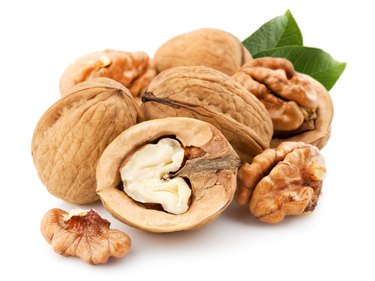
The systems of your body are both distinct and interactive and always working to maintain homeostasis, or equilibrium. To contribute to the overall physical equilibrium that sustains life, each system must meet its metabolic needs through the nutrition you get from food. Dietary protein, carbohydrates and fats supply both caloric energy and elements such as the amino acids that are used to form cells. Compounds in dietary minerals and vitamins may act as hormones or catalysts in reactions needed for body functions, such as the regulation of blood pressure.
Protein
Video of the Day
Foods provide two types of protein: Complete protein provides all eight essential amino acids, while incomplete protein provides some but not all of these. Animal-based foods that contain complete protein include beef, pork, lamb, chicken and turkey and their products, such as milk and eggs. Plant-based foods with incomplete protein provide various combinations of amino acids. Eating a variety of all types of protein foods will supply all the amino acids that help your body achieve homeostasis.
Video of the Day
Carbohydrates
Your body digests starch and sugar carbohydrates to use as energy to fuel metabolic tasks, such as breathing and blood circulation. Fiber carbohydrates are not digested and are not considered essential to homeostasis, although they do benefit digestive and cardiovascular health. Grains, such as wheat, oats, rice and corn, and vegetables, such as beans and peas, contain starch carbohydrates. Apples and other fruits, carrots and other vegetables and milk and other dairy products contain natural sugar carbohydrates.
Fatty Acids
Saturated, monounsaturated and polyunsaturated fatty acids, or fats, are found in all types of foods. Your body needs certain amounts of each kind for functions that promote homeostasis, such as body insulation and blood clotting. Saturated fats are abundant in animal-based foods, such as meats, fish and dairy products. Olive oil has larger proportions of monounsaturated fat, while nuts, such as walnuts, and seeds, such as sunflower seeds, have a great deal of polyunsaturated fat.
Minerals and Vitamins
Your body needs significant amounts of the macrominerals calcium, potassium, magnesium, chloride and phosphorus, and small amounts of the trace minerals iron, copper, zinc, iodine, fluoride and selenium to complete its metabolic processes. Thirteen vitamins are considered essential because your body does not produce enough or any, including A, C, D, E, K and the group of B vitamins -- thiamin, riboflavin, niacin, B-6, folate, B-12, pantothenic acid and biotin. A balanced diet of various fruits, vegetables, grains, nuts, seeds, beans, meats, fish and dairy products will supply adequate minerals and vitamins.